Impact
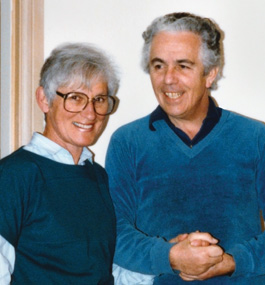
Charlotte and Robert Joly
Inspired by the University’s Values, Couple Leaves Brandeis a $5 Million Bequest
Although Robert and Charlotte Joly never stepped foot on the Brandeis campus, they admired the school from afar for its early stand against antisemitism and for hiring, in 1998, University Professor Anita Hill.
“When the Clarence Thomas hearings happened [in 1991], my mother was outraged about the lack of respect afforded Anita Hill,” explains Charlotte’s daughter Lisa Hochstein, a visual artist based in Santa Cruz, California. “When Brandeis hired Hill to teach there, Brandeis rose higher in her estimation.”
To show their appreciation for Hill’s hiring and the university’s founding values, Robert and Charlotte — who both passed away at age 85, in 2018 and 2019, respectively — left Brandeis a bequest gift currently valued at about $5 million. The gift will establish the Robert and Charlotte Joly Endowed Scholarship Fund, which will support Brandeis graduate students, with a preference for women pursuing doctorates in mathematics.
“A wonderful surprise in tune with our aspirations for the department” is how Dmitry Kleinbock, mathematics professor and acting chair of the mathematics department, describes the gift. “We’re expanding our graduate program and working hard to increase the number of female graduate students; this helps us on both fronts,” he says. “We’re very grateful to the Jolys for thinking of our department. Mathematics is important at our university and in society.”
Sponsoring a scholarship that advances women in mathematics is a blend of the couple’s interests, says Hochstein: Robert was a mathematician, and Charlotte believed that, when she was growing up, “opportunities for women were not as readily available as they should have been. As a 1970s feminist, she felt a strong commitment to women’s education and equal rights.” Charlotte also deeply admired Brandeis’ nondiscrimination policies, which trace back to its founding.
Both Charlotte and Robert came from modest backgrounds. However, through hard work, investments and savings they ended up with a significant estate. “They wanted to give back so their good fortune would further the good fortune of somebody else,” Hochstein says.
Charlotte was born in the Bronx to Hungarian immigrants (most of her parents’ family members were killed in the Holocaust). Her father, who was trained as an accountant in Hungary, worked as a waiter in the U.S. In her 20s, Charlotte moved to California, where she earned a master’s from Stanford University. She worked as a speech therapist and special-education teacher in the public-school system.
Robert grew up in a small village in France, where his parents owned a grocery store. He earned an engineering degree, then served in the French Navy. Later, he worked for an electronics company in Paris. At age 40, he was recruited by Hewlett-Packard in Palo Alto, California. “It was a real challenge for him,” says Pascale Joly, Robert’s niece. “He didn’t speak English very well, and he had to adapt to a new way of life and build new relationships.” While working at HP, Robert entered a mathematics PhD program at Stanford.
Charlotte and Robert, who met in Palo Alto, married in 1982. She was known as a fabulous cook, an avid athlete and a voracious reader. He was an accomplished furniture builder and in his 50s began taking violin lessons. After retiring, they moved to Washington state, where they both studied the Japanese language. Pascale says Charlotte courageously helped Robert through declining health during the last several years of his life.
Just months before Charlotte died from a heart condition, she had the chance to talk with Hill on the telephone. “She was facing her own mortality, and having the opportunity to speak with Anita Hill was a bright spot for her,” Hochstein says.
“To be able to speak with someone she admired so much — and the fact that Anita Hill took the time to speak with her — it meant a lot.”
— Abigail Klingbeil
The newly established Robert and Charlotte Joly Endowed Scholarship Fund will help Brandeis educate more trailblazing female mathematicians like Karen Uhlenbeck, MA’66, PhD’68, H’08, who in 2019 became the first woman to win the Abel Prize — an award modeled on the Nobel Prizes — since its inception in 2003.
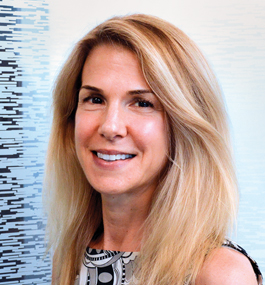
Zamira Korff
Standing Together for Students
As of this writing, we are still in the midst of COVID-19’s devastating rampage, with its full impact yet unknown.
The university has had to make difficult decisions that upend traditions. Commencement, for instance — the rite of passage eagerly looked forward to by seniors and their families — was postponed until a later, safer date.
We’ve appreciated the outpouring of suggestions from students, alumni, parents and friends on how best to honor our graduates. We will do all we can to celebrate this momentous milestone for the Class of 2020.
Over the past few months, many of you have contributed to the Student Emergency Grant Fund, to help address students’ most pressing financial burdens during the pandemic. I am so grateful for your support, which helps students with transportation home; technology to adapt to virtual instruction; and money for groceries, rent, medical expenses and other immediate necessities. I expected nothing less from our compassionate community!
The hardship for students was sudden and immense, and, unfortunately for many, will stretch their capacity to remain at the university. Scholarships and financial aid will take on a greater urgency for students and their families, and will help to keep a Brandeis education within reach. I am thankful so many of you are making gifts to support general scholarships and financial aid, and also maintaining contributions to endowed scholarship funds.
Many alumni also give generously of their time and expertise, and serve as creative sounding boards for students. In fortuitous timing, this spring we launched a student mentoring program through the Alumni Association, creating opportunities for alumni leaders to provide online advising for undergraduates in the areas of personal and professional growth. Because we anticipate the demand will increase, we plan to refine and expand this program. Alumni are an incredible resource for students and recent graduates navigating life’s uncertainties at this unique time.
Our faculty, too, have stepped up in profound ways to sustain the critical mission of educating students and mentoring them through an unprecedented crisis.
These months have reinforced what I knew to be true: Brandeisians unite to lift up students, and so many others, in extraordinary ways. We will stand together to overcome the tough ongoing challenges before us all.
Take good care and stay strong,
Zamira Korff
Senior Vice President of Institutional Advancement

Stephen J. Cloobeck ’83
Entrepreneur Gives $1M for Research Into the Workings of the Mind
Stephen J. Cloobeck ’83 says his Brandeis studies in neuroscience and psychology helped lead to his remarkable business achievements. Now the former CEO and chairman of Diamond Resorts International is donating $1 million that will aid Brandeisians’ efforts to shed light on human intelligence.
Cloobeck’s gift will support research by two faculty members who were his mentors at Brandeis: University Professor Eve Marder ’69, the Victor and Gwendolyn Beinfield Professor of Neuroscience, and Arthur Wingfield, the Nancy Lurie Marks Professor Emeritus of Neuroscience. Both are affiliated with the Benjamin and Mae Volen National Center for Complex Systems, a Brandeis research facility dedicated to the study of the brain and intelligence.
Marder’s research on small neural circuits found in lobsters and crabs has revolutionized understanding of the fundamental nature of neuronal circuit operation, including how neuromodulators control behavioral outputs and how the stability of circuits is maintained over time. Wingfield’s studies focus on the effects of hearing loss on memory problems during the aging process.
In the early 1980s, when Cloobeck was a Brandeis undergraduate pursuing independent studies toward a degree in biopsychology, Marder and Wingfield were his thesis advisers. (They later married, which Cloobeck jokingly takes credit for.)
Marder and Wingfield hope to put a portion of Cloobeck’s gift toward travel grants that enable undergraduate neuroscience students to present at national and international conferences.
“Stephen Cloobeck’s generosity will enable our researchers to develop new lines of investigation while also including more undergraduates in this innovative research,” says President Ron Liebowitz. “We are grateful to him for this gift, which will strengthen our unique academic ecosystem and advance an important part of our mission.”
Cloobeck founded Diamond Resorts International, a timeshare hospitality company headquartered in Las Vegas. He was also the inaugural chairman of Brand USA, a government nonprofit that promotes travel to the U.S. He is widely recognized for his appearances on the television show “Undercover Boss.”
He says he is “100%” sure the skills he honed during his neuroscience and psychology studies contributed to his business successes: “If not for Brandeis, I wouldn’t be doing what I’m doing today. It all comes back to Eve and Art.”
Dyslexia also played a part, he says. Although he didn’t know it as an undergraduate, Cloobeck later discovered he is highly dyslexic. His learning disability forces him to look at things differently, to think outside the box.
“If you look at some of the most successful dyslexics, they’re all entrepreneurs,” says Cloobeck, who built Diamond Resorts International into the world’s second-largest timeshare company, with 30,000 employees at more than 400 properties in 33 countries.
Cloobeck has donated proceeds from his 2018 book “Checking In: Hospitality-Driven Thinking, Business and You” to dyslexia research and education.
Now his gift to Brandeis will contribute to a greater understanding of the workings of human intelligence.
“It’s terrific,” says Wingfield. “I called him to say thank you, and he said, ‘No, thank you!’”
Says Marder, “How wonderful it has been to reengage with Stephen after 38 years, to get to know him not only as a student but in the fullness of his adult life.”
Cloobeck hopes research supported by his gift will aid in the fight against Alzheimer’s disease, which was the focus of his Brandeis thesis and afflicted his own father.
He also hopes his gift will encourage fellow alumni to step up. “Give whatever you can give,” he urges. “Remember your roots and who enabled you to do what you’re doing today. Take care of the people who taught you everything.”
— Mark Sullivan
Picture-Perfect
A photo gallery from events and meetings around the world.
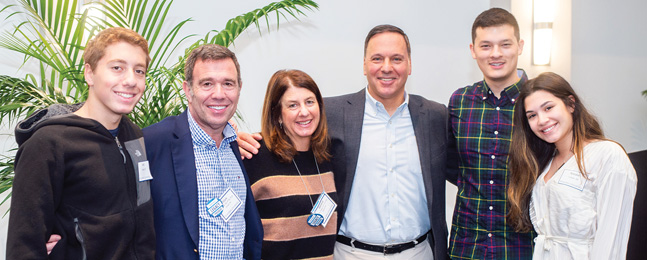
The Family Weekend Legacy Brunch honored alumni whose children and/or grandchildren have made attending Brandeis a family tradition. At the event, Mark Fischer ’83 and Marlene Kern Fischer ’85, P’18, P’23, spoke about their family’s strong ties to the university. From left: Isaac Fischer ’23; Mark and Marlene; President Ron Liebowitz; Jonah Fischer ’18; and Natalie Cohen ’20.
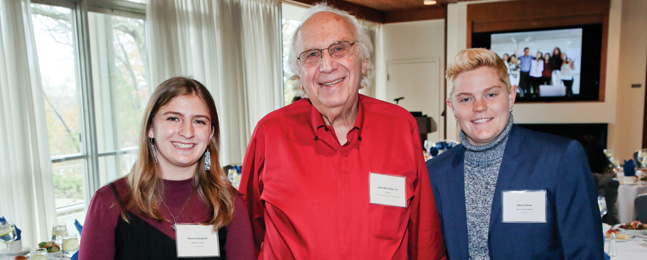
Students, staff and friends enjoyed the annual Louis D. Brandeis Legacy Fund for Social Justice World of Work Fellows Luncheon. Founded by Jules Bernstein ’57, the Legacy Fund offers generous financial support to 30 students every year, allowing them to pursue an unpaid full-time internship with organizations that address social justice issues. Pictured: Bernstein with 2019 WOW fellows Renee Korgood and Sierra Dana, both ’20.
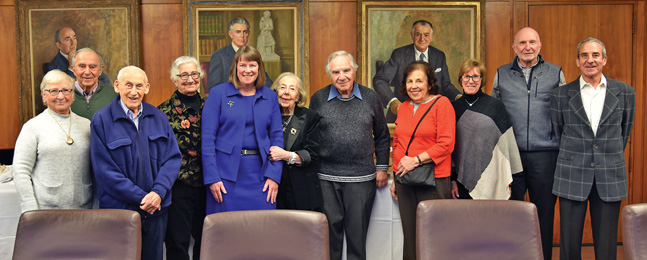
Members of the Sachar Legacy Society, which honors those who have included Brandeis in their estate plans, gathered for their annual luncheon. From left: Sydney ’54 and Norman Abend; Irving Backman, P’77; Roberta Apfel ’58; Provost Lisa Lynch, P’17, H’17; Fellow Ellie Shuman; Michael Rosen ’59; Stephanie Lorber Karger ’63; Fellow Leslie and Arthur Pearlstein, P’94; and Arthur Novakoff.
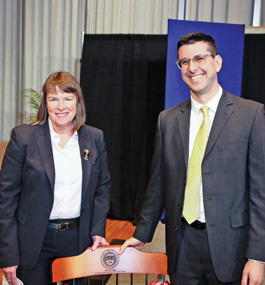
Provost Lisa Lynch, P’17, H’17, formally presented Alexander Kaye, assistant professor in the Department of Near Eastern and Judaic Studies, with the Karl, Harry and Helen Stoll Family Chair in Israel Studies at an on-campus lecture last fall.
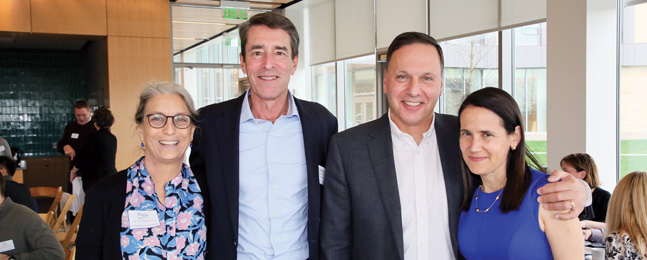
Parents Leadership Council co-chairs Peggy Segal and David Topper, both P’21, with President Ron Liebowitz and Jessica Liebowitz at the group’s annual luncheon, held in October during Family Weekend.
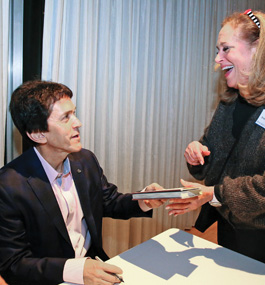
In January, Mitch Albom ’79, author of “Tuesdays With Morrie,” talked about his most recent book, “Finding Chika,” before a rapt audience in Spingold Theater. The event included a book signing and a dessert reception. Here, Albom signs a copy of the book for Linda Shapiro Waintrup, daughter of longtime Brandeis benefactors Carl and Ruth Shapiro.
